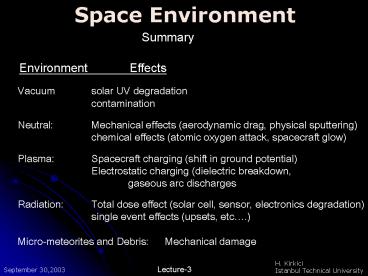Space Environment - PowerPoint PPT Presentation
Title:
Space Environment
Description:
chemical effects (atomic oxygen attack, spacecraft glow) Plasma: Spacecraft charging (shift in ground ... and year), and what effects were observed by scientism ... – PowerPoint PPT presentation
Number of Views:78
Avg rating:3.0/5.0
Title: Space Environment
1
Space Environment
Summary
Environment Effects
Vacuum solar UV degradation contamination
Neutral Mechanical effects (aerodynamic drag,
physical sputtering) chemical effects (atomic
oxygen attack, spacecraft glow)
Plasma Spacecraft charging (shift in ground
potential) Electrostatic charging (dielectric
breakdown, gaseous arc discharges
Radiation Total dose effect (solar cell, sensor,
electronics degradation) single event effects
(upsets, etc.)
Micro-meteorites and Debris Mechanical damage
H. Kirkici Istanbul Technical University
Lecture-3
September 30,2003
2
Space Environment
Orbit Types
Sun
Geosynchronous Orbit (GEO) 35,800 km Mid-Earth
Orbit (HOE) 1000-2000 km Low Earth Orbit
(LOE) less that 1000 km
Earth
H. Kirkici Istanbul Technical University
Lecture-3
September 30,2003
3
Space Environment
Spacecraft Subsystems
Attitude determination and control Vehicle
Stability and pointing control Avionics Data
and command relay to payloads subsystems Electric
al Power Power generation and
distribution Propulsion Maneuver vehicle into
desired orbit Structure Integrity during launch
and maneuver Telemetry, tracking and
communication Command and data handling with
the ground Thermal control Maintain
temperature balance
H. Kirkici Istanbul Technical University
Lecture-3
September 30,2003
4
Space Environment
Example A typical Geostationary communication
satellite
Station-keeping Contains thrust and
stabilization subsystems (control of orbital
altitude, position, and direction)
Power sub-system contains electronics to convert
solar power to electrical and supply power
the vehicle
Command and telemetry transmits data to Earth
receives commands from earth
Antenna serves to transmit and receive data
Transponder receive signals, amplify, change
frequencies, and re-sent the signal to Earth
H. Kirkici Istanbul Technical University
Lecture-3
September 30,2003
5
Space Environment
Some Satellites on Orbit
Gamma ray observatory
X-ray observatory
Extreme UV
UV
Visible
IR
Micro-wave
H. Kirkici Istanbul Technical University
Lecture-3
September 30,2003
6
Space Environment
A typical satellite orbit in LOE (Speed 8km/s)
Day and night time line on Earth
H. Kirkici Istanbul Technical University
Lecture-3
September 30,2003
7
Space Environment
- HW-1
- Due Date October 1, 2003
- Give names of at lest for 4 orbital satellite
- subsystems in a typical communication satellite.
- Describe the functions of these subsystems listed
above - in few sentences.
- When was the last solar storm observed (give the
month - and year), and what effects were observed by
scientism - due to this storm on Earth or on satellites?
H. Kirkici Istanbul Technical University
Lecture-3
September 30,2003
8
Space Environment
QUESTIONS?
H. Kirkici Istanbul Technical University
Lecture-3
September 30,2003































